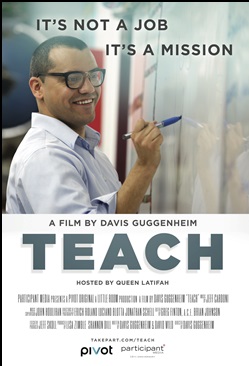

In Waiting for Superman, Guggenheim follows the story of five students ranging from elementary school to middle school. Although, the movie is spent mostly talking about the adult politics that secretly determine the lives of these innocent children. At some point, both Waiting for Superman and TEACH underline how education is NOT about the students but rather the adults. This is a sad and harsh reality that is not fair for people who all deserve the best education. Waiting for Superman discusses this issue thoroughly. They movie discussed bad teachers, or teachers who were not producing good results for their students. Most would think, well why not just fire them? One of the many problems with that though, is due to tenure. Tenure is a legal contract that is supposed to protect teachers who may not deserve to be fired. Although, the movie argued that tenure is given out after a short period of time (two years) to unworthy teachers who then decide to no longer do their job- but since they have tenure, it is much harder for them to get fired. Consequently, schools preform the "lemon dance." The lemon dance is essentially when schools hand-off under-preforming teachers to other schools. Although, if this continues with countless other schools, eventually one school becomes a haven of bad teachers- which then bad students are sent to and the problem continues.
Tenure is not the only source of problems within the education system. Waiting for Superman also discussed how teacher unions have a negative impact on students. Teacher unions were designed to also protect teachers and essentially act as an insurance policy although, since the teachers know that they have a legal contract that is fully supported by the teachers’ unions, they tend to slack off in their instruction and effort that they give their students. What happens is that teachers are unable to be fired by the school board. In the film, we see that one of the teachers is relaxing in his chair reading a newspaper article while students in the back are gambling. The director also uses clips from previous research where a student puts a camera in his backpack and video tapes the class as it is in motion. By using this form of evidence, Guggenheim is making the statement that teacher union contracts and teacher tenures produce lazy, uncaring, and clueless teachers.
Not all teachers who are part of union contracts or have tenure are lazy or uncaring. In TEACH, Guggenheim follows the teaching lives of four adults: Maurice, Geneviève, Andrew and George. Each of these teachers do not have it easy with their job but each of them claim teaching is worth it. These four teachers work hard and even spend their own money, time and effort outside of class to make sure their students are developing. For example, Maurice spends his time trying to connect with an inconsistent speech therapist who is not helping and instead, he decides to tutor his struggling student outside of class. Andrew spends his time contacting social workers for his students who have been the victim of domestic violence and George organized students to talk to a board so their funding wouldn't get withdrawn. Even though TEACH is short, Guggenheim was able to capture complicated aspects of the education system.
Personally, I greatly appreciated these two documentaries. Together, I would give them 4.75 stars out of 5. As I mentioned, they gave insight into the complicated problem of the American education system. They were thought-provoking and had excellent examples with detailed explanations. I would not give it 5/5 because I thought Waiting for Superman did not look at how the education system is a combination of not only the politics between teachers and government, but also parents. From the five families the movie followed, each were of good students who cared about their education and had parents who cared for them too. That is not always true of families. I would have liked to movie to have gotten insight from families who do not care about education because Waiting for Superman, at least for me, pointed too much blame at the teachers.
No comments:
Post a Comment